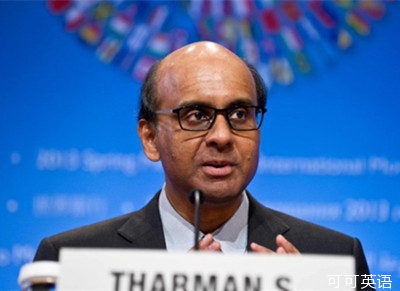(单词翻译:单击)
Communiqué of the Twenty-Eighth Meeting of the International Monetary and Financial Committee, Chaired by Mr. Tharman Shanmugaratnam, Deputy Prime Minister of Singapore and Minister for Finance
国际货币与金融委员会第二十八次会议公报
会议由新加坡副总理兼财政部长尚达曼主持
October 12, 2013
2013年10月12日
The global recovery is continuing. Growth remains subdued, however, and downside risks persist, with some new risks emerging. There are encouraging signs of improving activity in advanced economies, while growth in many emerging market economies has moderated. Growth has generally remained resilient in low-income countries. We will build on recent progress and implement more ambitious and coherent policies for strong, sustainable, and balanced growth, while reducing market volatility. This requires carefully managing multiple transitions, including a shift in growth dynamics, normalizing global financial conditions, achieving fiscal sustainability, a rebalancing of global demand, and moving to a more stable global financial system. Structural policies to boost productivity, reduce unemployment and to achieve more inclusive growth are warranted in many countries. We welcome the directions set forth in the Managing Director’s Global Policy Agenda.
全球经济在继续复苏。然而,增长依然疲软,下行风险持续存在,新的风险在出现。先进经济体的活动出现了可喜的改善迹象,但许多新兴市场经济体的增长有所减缓。低收入国家的增长普遍保持了抗冲击力。我们需要在近期所取得的进展的基础上,实施力度更大的、连贯一致的政策,以实现强劲、可持续、均衡的增长,同时努力缓解市场波动。为此,必须谨慎地管理多个转变过程,包括增长动态的变化、全球金融条件的正常化、财政可持续性的努力实现、全球需求的再平衡调整,以及向更稳定的全球金融体系的不断迈进。许多国家应实施结构性改革,以提高生产率,减少失业,实现更具包容性的增长。我们对总裁全球政策议程所确定的方向表示欢迎。
Advanced economies. The recovery in the United States has gained ground, stimulus measures have induced a recovery in Japan, the euro area is emerging from recession, and in some other advanced economies including the United Kingdom growth is already picking up. Accommodative monetary policies have helped support global growth while maintaining stable prices, and remain appropriate, and should be accompanied by credible fiscal policies and further financial sector and structural reforms. The eventual transition toward the normalization of monetary policy in the context of strengthened and sustained growth should be well timed, carefully calibrated, and clearly communicated. Where country circumstances allow, medium-term fiscal plans should be implemented flexibly to take account of near-term economic conditions to support growth and job creation, while placing government debt on a sustainable track. These actions will help to mitigate risks and manage spillovers, including those stemming from increased capital flow volatility, and to achieve strong, sustained and balanced growth. The United States needs to take urgent action to address short-term fiscal uncertainties. The euro area should build on progress toward banking union and further reduce financial market fragmentation. Japan should implement medium-term fiscal consolidation, and structural reforms to invigorate growth.
先进经济体。美国的复苏在巩固,日本采取的措施已促使经济开始恢复,欧元区正走出衰退,其他一些先进经济体(包括英国)的增长正在加快。通融性货币政策支持了全球增长并维持了稳定的价格,目前这种政策仍是适当的,但与此同时,还应实施可信的财政政策,并进一步实施金融部门和结构性改革。随着经济增长持续增强,最终将实现货币政策的正常化,对于这种正常化,应确定最佳时机,谨慎做出安排,明确加以沟通。各国在本国具体情况允许的情况下,应灵活地实施中期财政计划,着眼于近期经济状况,支持增长和就业,同时使政府债务走上可持续道路。这些行动将有助于缓解风险和处理溢出效应(包括资本流动波动性增大所带来的风险和溢出效应),并实现强劲、可持续、均衡的增长。美国迫切需要采取行动,解决短期财政不确定性。欧元区应再接再厉,在建立银行业联盟方面继续努力,并进一步解决金融市场分割问题。日本应实施中期财政整顿,并通过结构性改革加快经济增长。

Emerging market and developing countries. Growth in emerging market economies continues to account for the bulk of global growth, but has moderated, in a few cases to a more sustainable level. Fundamentals and policy frameworks are generally stronger, but domestic structural challenges remain. Recent volatility in capital flows and financial markets has created new challenges in some countries. Macroeconomic policies, including exchange rate policies, need to be sound. When dealing with macroeconomic or financial stability risks arising from large and volatile capital flows, the necessary macroeconomic policy adjustment could be supported by prudential measures and, as appropriate, capital flow management measures. Fiscal consolidation remains a high priority in countries with large fiscal imbalances, while others should rebuild buffers, unless growth deteriorates significantly. Policies to address structural obstacles and enhance productivity are an ongoing effort toward strong, sustainable, and balanced growth. We recognize the effort in many smaller developing economies, especially in Africa, to sustain higher growth, increase participation, and transform their economic structures. We welcome the Fund’s strengthened engagement with small states and look forward to the implementation of the work program in their support. We recognize the challenges faced by the Arab countries in transition and encourage these countries to implement reforms needed for sustainable growth and job creation. Substantial donor support from the region has been provided and we call on bilateral and multilateral partners to step up their contributions as appropriate in support of reforms. We encourage the Fund to provide strengthened financial support, policy advice, and capacity building tailored to country-specific needs and circumstances.
新兴市场和发展中国家。新兴市场经济体的增长在全球增长中仍占相当大一部分,但已经减缓,对于一些经济体而言,这使得它们的增速降到了一个更可持续的水平。经济基本面和政策框架总体而言较过去更强,但国内结构性挑战依然存在。近期资本流动和金融市场的波动使一些国家面临新的挑战。需要保持宏观经济政策(包括汇率政策)的稳健性。为了应对大规模、波动不定的资本流动带来的宏观经济或金融稳定风险,在实施必要的宏观经济政策调整的同时,还应采取审慎措施,适当时还可采取资本流动管理措施。在财政失衡严重的国家,财政整顿仍是重中之重。其他国家应重建缓冲,除非增长显著恶化。应持续实施有关政策,克服结构性障碍并提高生产率,以实现强劲、可持续和均衡的增长。我们看到,许多小型发展中经济体(特别是在非洲)已付出大量努力,以维持高增长、增强经济参与性和调整经济结构。我们对基金组织加强对小国的工作表示欢迎,并期待着基金组织实施支持这些国家的工作计划。我们认识到阿拉伯国家在经济转型过程中面临的挑战,并鼓励这些国家实施必要改革,以实现可持续增长和就业创造。该地区捐助方已提供了大量支持,我们呼吁双边和多边伙伴视情况增加捐助,为改革提供支持。我们鼓励基金组织根据各国具体需要和国情,加强资金支持、政策建议和能力建设协助。
Low-income countries. Growth has generally remained resilient. Strengthening fiscal and reserve positions, including through revenue mobilization and better targeting of subsidies, can provide buffers that could be used in the event that downside risks materialize. Sustained and more inclusive growth requires continued actions to promote financial deepening, productive public investment and services, and sound natural resource wealth management. We welcome the receipt of assurances needed for making the Fund’s concessional lending to low-income countries self-sustaining, and urge members now to make good on their pledges.
低收入国家。经济增长总体保持了抗冲击力。这些国家应努力强化财政和储备状况,措施包括增加税收收入和提高补贴针对性,这将提供缓冲,从而在下行风险变为现实时能加以利用。为实现可持续的、更具包容性的增长,需要继续采取行动促进金融深化,开展有成效的公共投资和服务,并实行稳健的自然资源财富管理机制。基金组织确保低收入国家优惠贷款的自我持续性的工作已得到落实,我们对此表示欢迎,并敦促成员国现在履行其承诺。
Policy coherence. The Fund should continue to provide a forum to stimulate analysis and multilateral dialogue that promotes policy coherence and concerted action to manage spillovers, including those arising from the eventual and welcome normalization of monetary policy, mitigate risks, and support strong, sustainable and balanced growth, and job creation. Global imbalances have declined, for both structural and cyclical reasons, but rebalancing remains a key priority. Looking forward, policies in many countries will need to play a larger role in sustaining adjustment. Deficit countries should continue to raise national saving and competitiveness, while surplus countries need to boost domestic sources of growth. We reaffirm our commitment to refrain from competitive devaluations and all forms of protectionism. Global financial reforms, including in the areas of “too-big-to-fail,” international capital standards, cross-border resolution, derivatives markets, and addressing the potential systemic risks in shadow banking, need to be implemented promptly and consistently. Further progress is needed to close data gaps, enhance fiscal transparency, combat money laundering and the financing of terrorism, and fight cross-border tax evasion and tax avoidance. We encourage the Fund to examine these issues as part of its bilateral and multilateral surveillance, and to work in collaboration with other international institutions.
政策一致性。基金组织应继续提供一个旨在加强分析和多边对话的论坛,促进政策一致性和行动协同性,以管理溢出效应(包括货币政策最终的、必要的正常化所带来的溢出效应)、缓解风险,并支持强劲、可持续和均衡的增长以及就业的创造。在结构性和周期性因素的作用下,全球失衡已经减轻,但再平衡仍是一项重点任务。今后,在许多国家,政策需要在维持调整过程中发挥更大作用。逆差国应继续提高国民储蓄和竞争力,而顺差国需加强国内增长源。我们再次承诺,将避免采取竞争性贬值和各种形式的保护主义。需要迅速、一致地实施全球金融改革,包括在“大而不倒”的机构、国际资本标准、跨境破产处置、衍生产品市场以及解决影子银行业潜在系统性风险等领域。在克服数据缺陷、提高财政透明度、打击洗钱和恐怖主义融资以及遏制跨境逃税和避税等方面,需取得进一步的进展。我们鼓励基金组织在双边和多边监督中分析这些问题并与其他国际机构开展合作。
IMF surveillance. We welcome the progress in implementing the Fund’s strengthened surveillance framework, including through the Financial Surveillance Strategy, pilot External Sector Report, Spillover Report, and enhanced analysis of macro-financial linkages in Article IV consultations, and tailored advice on promoting inclusive growth and job creation. We look forward to the upcoming Triennial Surveillance Review, as well as further analysis of monetary and macroprudential policies and associated spillovers, reserve adequacy, global liquidity indicators, capital flows, and the interaction of public and private sector vulnerabilities.
基金组织监督。我们欢迎在落实基金组织强化的监督框架方面取得的进展,有关措施包括出台“金融监督战略”、试行“对外部门报告”、“溢出效应报告”、在第四条磋商中加强对宏观金融联系的分析,以及根据各国情况提供关于促进包容性增长和就业创造的建议。我们期待着即将开始的三年期监督检查,也期待着对货币和宏观审慎政策及相关溢出效应、储备充足性、全球流动性指标、资本流动、公共与私人部门脆弱性的相互作用等方面开展进一步分析。
IMF lending. External financing, including on a precautionary basis, can help facilitate orderly adjustment. The Fund continues to be prepared to offer financing to support appropriate adjustments and reforms. We look forward to a flexible and voluntary dialogue between the Fund and regional financing arrangements on an ongoing basis, the review of some key instruments (Flexible Credit Line, Precautionary and Liquidity Line, Rapid Financing Instrument), a follow-up crisis program review, and further consideration of the Fund’s lending policy in high debt situations. We look forward to the finalization of the review of the IMF debt limits policy, recognizing the importance of strengthening and promoting sustainable financing practices by all stakeholders.
基金组织贷款。外部融资(包括预防性融资)有助于促进有序的调整。基金组织需继续随时准备提供资金,支持适当的调整和改革。我们期待着基金组织与地区融资安排持续开展灵活、自愿的对话,对一些主要工具(灵活信贷额度;预防性和流动性额度;快速融资工具)进行检查,对危机规划开展后续检查,并进一步考虑基金组织对高债务国家的贷款政策。我们认识到,所有利益方加强和促进可持续的融资做法非常重要,因此,我们期待着最终完成对基金组织债务限额政策的检查。
Governance. We continue to attach the highest priority to the IMF governance and quota reform to enhance the Fund’s credibility, legitimacy and effectiveness. We urge all members who have yet to ratify the 2010 reforms to do so without delay. We remain committed to completing the 15th General Review of Quotas by January 2014, and urge the Executive Board to agree on a new quota formula as part of that review. We reaffirm that any realignment in quota shares is expected to result in increased shares for dynamic economies in line with their relative positions in the world economy, and hence likely in the share of emerging market and developing countries as a whole. Steps shall be taken to protect the voice and representation of the poorest members.
治理。我们继续高度重视为增强基金组织可信性、合法性和有效性而实施的基金组织治理和份额改革。我们敦促所有尚未批准2010年改革的成员国尽快批准改革。我们继续致力于在2014年1月之前完成第十五次份额总检查,并敦促执重会在该检查中就新的份额公式达成一致。我们重申,份额比重的任何调整都应使具有活力的经济体拥有更高的份额比重,以符合它们在世界经济中的相对地位,因此,新兴市场和发展中国家作为一个整体的份额比重很可能会上升。应采取步骤保护最贫穷成员国的发言权和代表性。
Next IMFC meeting. Our next meeting will be held in Washington, D.C. on April 11-12, 2014.
国际货币与金融委员会的下一次会议。 我们的下一次会议将于2014年4月11-12日在华盛顿特区举行。

更多精品翻译素材,敬请关注可可英语。


